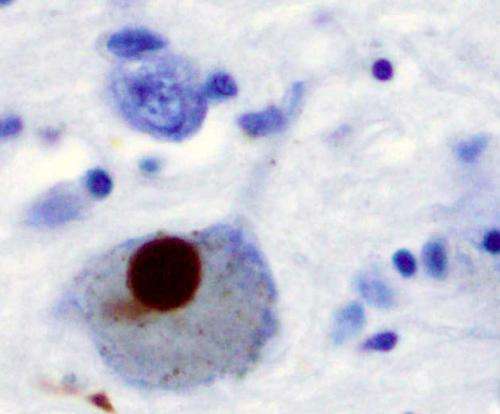
New research shows evidence of inflammation in the blood of Parkinson’s disease patients during the earliest stages of the disease, lending support to theories that inflammation is a major driver of PD. The findings, from researchers at the Alabama Udall Center at the University of Alabama at Birmingham, were published April 13 in npj Parkinson’s Disease, part of the Nature Partner Journal series in partnership with the Parkinson’s Foundation.
UAB is one of six National Institutes of Health-funded Morris K. Udall Centers of Excellence in Parkinson’s Disease Research.
“There is a growing body of evidence suggesting that inflammation plays a major role in the development and progression of Parkinson’s disease,” said David Standaert, M.D., Ph.D., chair of the UAB Department of Neurology in the School of Medicine and senior author of the study. “This is one of the first studies to pinpoint inflammation in the blood in patients with early PD, supporting the idea that systemic immune system activation is present early in PD.”
Standaert also says the study revealed interesting differences in the inflammation signature in women compared to men. While PD is much more common in men, there is increasing evidence that there are also other differences between the sexes in the symptoms and course of the disease. The findings bolster the idea that different approaches to treatment are needed based on the sex of the patient.
The study enrolled 34 patients, 21 males and 13 females. Eighteen had early Parkinson’s disease and 16 were healthy age-matched controls. Those with PD were within two years of symptom onset and had not begun taking anti-Parkinsonian medications.

“The majority of studies into the role of inflammation in PD have been conducted in patients with long-standing disease and wide variations in disease severity. Most had also received a number of different treatments for the disease,” said first author Samantha Carlisle, Ph.D., with the UAB Center for Clinical and Translational Science. “We looked at newly diagnosed patients to improve our understanding of whether inflammation is present early on, or develops as the disease progresses.”
The study examined blood monocytes, cells that are derived from bone marrow, which have been linked to the development of PD. They appear to have a central role in immune signaling through engulfing, processing and presenting foreign antigens for recognition by the adaptive arm of the immune system, thus turning on the immune system in the presence of PD.
The research team used molecular approaches to examine the state of activation of peripheral blood monocytes in human PD. They found evidence of inflammation in blood monocytes, with an unexpectedly strong effect in women.
“We found that there was a striking effect of sex on monocyte gene expression, with increased inflammatory activation of monocytes in females with PD,” said Hongwei Qin, Ph.D., associate professor in the UAB Department of Cell, Integrated and Developmental Biology. “In males, the activation patterns were more diverse. This indicates the importance of systemic monocyte activation in PD, and the importance of studies which examine how men and women respond in different ways to the disease.”
The Parkinson’s Foundation estimates there are nearly one million people living with Parkinson’s disease in the United States and more than 10 million worldwide. Men are 1.5 times more likely to have PD than women.
Source: Read Full Article
